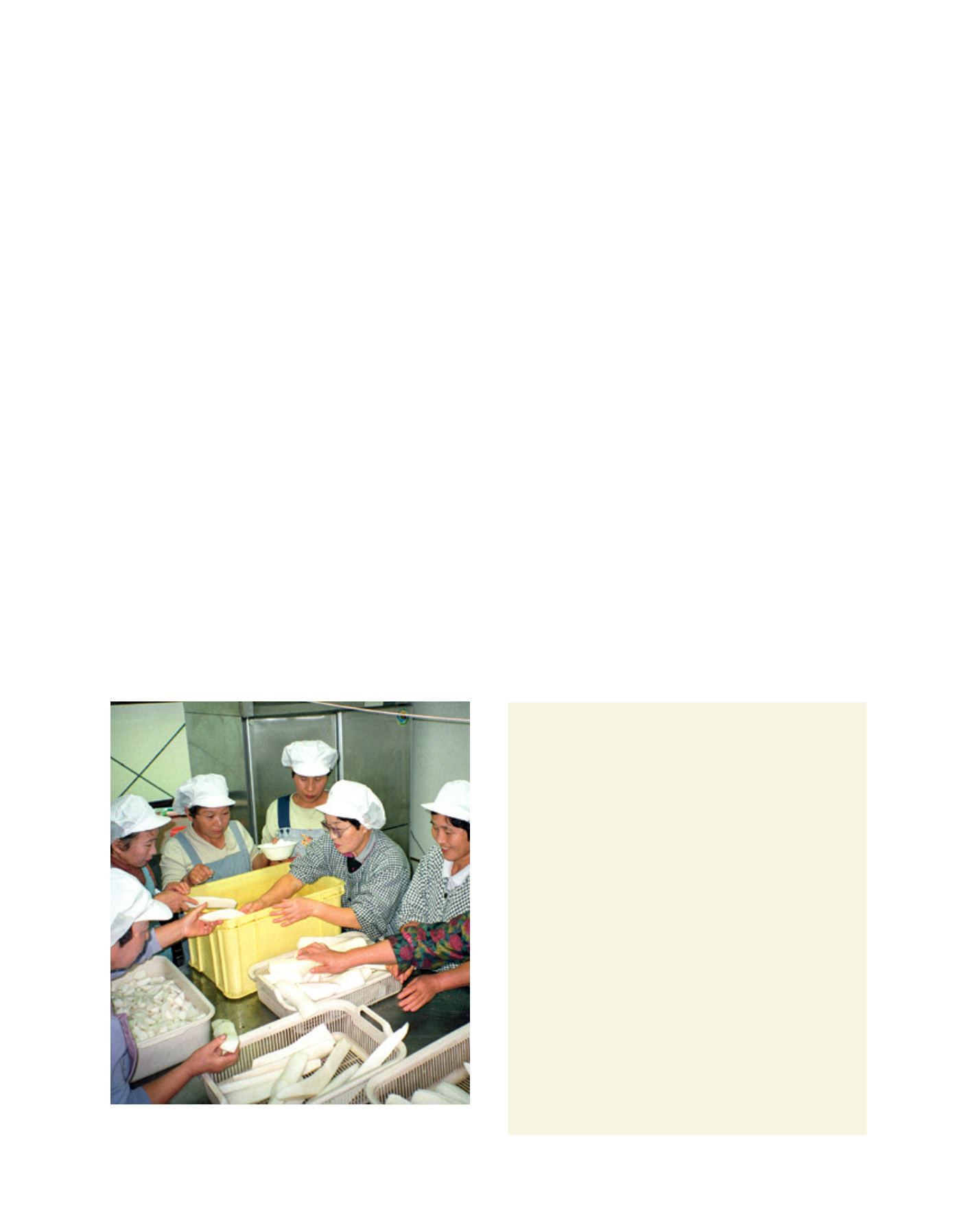

[
] 160
residents to live safely, as well as providing the vast majority
of the food production in Japan. They have also been playing
a leading role in revitalizing local communities through
rediscovering attractive points of the rural area and making
them appealing to urban residents in recent years.
The JA: a mutual cooperative organization
A ‘JA’ (an agricultural cooperative) is an organization
that is capitalized, managed and utilized by its members.
A hamlet-level settlement, which is a cohesive unit of
neighbour families, is recognized as an operationally
fundamental organization of a JA. Each JA represents 224
settlements on average, and each settlement consists of
around 25 households.
3
Representatives of the members
and executive board members of the JA are elected from
those settlements.
Recently, efforts to conserve agricultural land as farmland
and assure successive local farming to the next generation
have become more critical as farmers are ageing. Therefore,
the JA Group is now promoting a Local Farming Vision
movement, in which people get together to envision their
desirable future of local farming and living as a whole, and to
put this vision into action in each hamlet-level settlement or
several hamlet organizations together. A local JA in unison
with a local government provides necessary assistance
towards achieving the vision from the aspect of businesses,
activities and policies.
The movement aims to build rich and sound communi-
ties by increasing farm production and farmers’ incomes
through thorough intensive discussion on how to make
an attractive production area by clarifying each individual
farmer’s role. These objectives or goals have in part resulted
in the growth of the above-mentioned corporation enti-
ties, quite a few of which are community farming groups
that have been incorporated as consolidations of family-
operated farms. The JA Group has been promoting this
nationwide movement in order to achieve more attractive
farming based on each family-operated farm as a solid foun-
dation, through enhancing productivity and encouraging
individual family farmers to play more active roles in their
local communities.
Assistance to family farmers
Each JA has many member groups which are organized by
members’ common interests, besides hamlet settlement organ-
izations that serve as the fundamental unit. Every JA makes
every effort to foster its members’ awareness of participating
in the JA movement, and to strengthen its organizational basis
through encouraging members to act on their own initiative
as well as providing necessary assistance.
For instance, member producers organize each ‘commodity
group’ by their respective commodities within a JA, and they
make collective efforts such as improving the quality and the
quantity of their commodities, as well as their safety manage-
ment in farming, by making use of farm guidance services
provided by a JA. Member producers also make their best
efforts together to meet strict shipping standards that reflect
Japanese consumers’ voice, from size, shape, taste and appear-
ance to chemical usage reduction, so that they can sell their
products at the best price and find new markets.
In addition, younger-generation farmers who will play
leading roles in the future of JAs and local communities,
and local women residents interested in issues including
food, environment and the safety of their communities,
JA women’s associations work together to address their common issues and
interests such as food, environment and the safety of their communities
Image: The Japan Agricultural News
The JA charter
The JA Group set its common charter in 1997, in which it proclaims
its commitment to play a major role in contributing to local
economies and societies.
JA charter: our aim
We, members, executives and staff of a JA shall act, based on
the basic definition, values and principles of the cooperative
movement: volition, independence, participation, democratic
member control, equity, solidarity and more.
We shall also commit to innovate our organization, businesses
and operation from the global perspective of environmental
change. In addition, we shall make our best efforts to realize a
more democratic, equitable society through collaborating with
cooperative allies at a local, national and global level.
For this reason, we shall play our social role as an organization
rooted in agriculture and local societies through engaging in the
following. We shall make our best efforts to:
• Keep our food healthy and conserve greenery and water in our
country through promoting local farming
• Realize prosperous and secure local societies through
contributing to environment, culture and welfare
• Achieve our goal in a cooperative manner through voluntary
participation and solidarity
• Operate a JA soundly based on principles of voluntary and
independent management and increase the public trust
• Pursue a meaningful life together through learning and practising
a philosophy of cooperation.
D
eep
R
oots
















